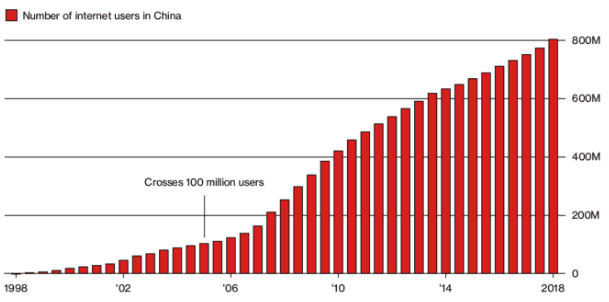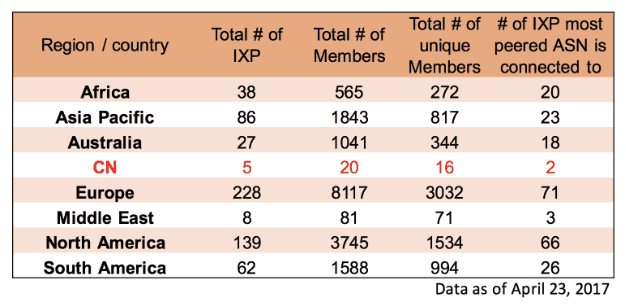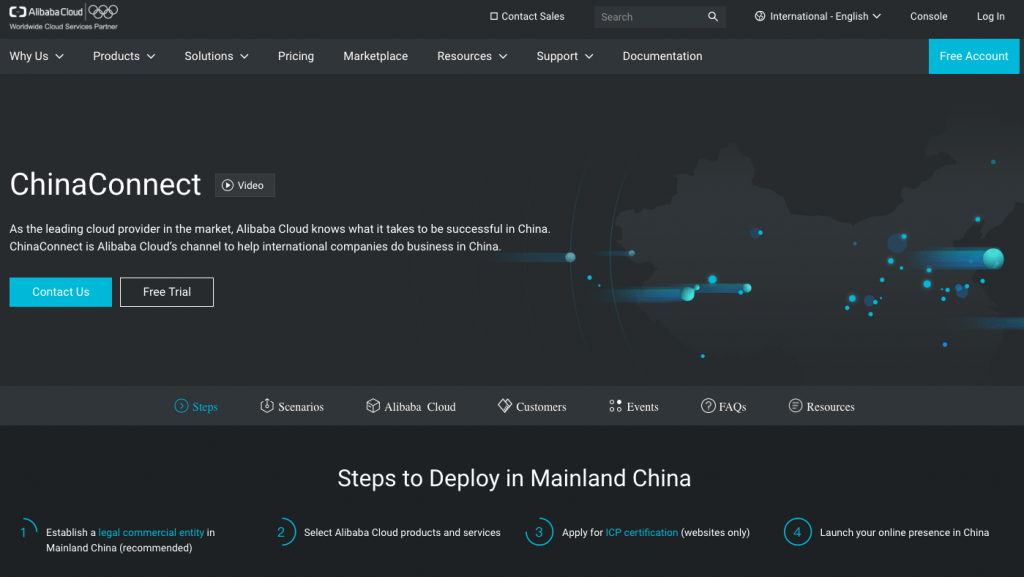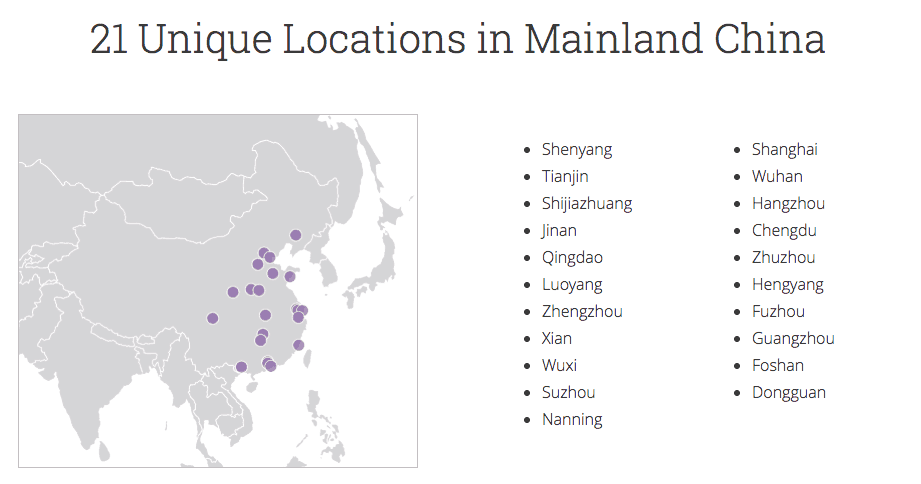Why Does All My Website Traffic Come From China
Report states that China's internet users were roughly 900 million in January 2021. This is equivalent to the total population of Japan, Russia, Mexico, and the US combined. Without a doubt, this means that China's online market has plenty of opportunities to explore.
That said, entering this vast market doesn't come without challenges: Chinese site visitors expect a website to load in less than two seconds, but 90% of non-Chinese websites take five seconds or longer to load in China.
In this article we'll uncover the main reasons behind this issue and share some actionable advice to make your website load faster for Chinese visitors.

Data: China Internet Network Information Center; graphic by Bloomberg Businessweek
Why your website is slow in China
The Chinese internet ecosystem works very differently from other countries. Therefore, there are numerous possible reasons for slow loading foreign websites in China. In this article, we'll focus on two main reasons.
Reason 1: Poor connection between ISP's
Despite the vastness of the country, there are only 4 main ISP's ( internet service providers) in China: China Telecom, China Unicom, China Mobile, and China Education & Research Network (CERNET). Between the 4 of them, they cover about 95% of the total internet traffic in China.
Connections that need to pass from one ISP to another are required to go through an Internet Exchange Point or IXP . But in China, the amount of IXP's is limited, because these 4 providers are somewhat reluctant to open up the market to other providers.
Due to its limited amounts and large number of internet users, these IXP's often get heavily congested. This causes a poor interconnection between local ISP's, and data traveling across the country may never reach the targeted users.

Additionally, peering with China Telecom, China Unicom, and China Mobile from outside of China is very expensive, especially in the APAC region. Direct peering with these providers often means paying premium pricing.
Combining these factors, we get: limited connectivity, lower internet coverage, and less peering points to support the demand of China's 900 million internet users.

Reason 2: The Great Firewall of China
The Great Firewall of China -or GFW is a combination of legislative actions and technologies to regulate the internet within China's borders. What it mainly boils down to is blocked access to selected foreign websites and applications, and slowed-down cross-border internet traffic. Examples of famous websites and applications blocked by the GFW include Facebook, Google, Instagram, and more.
The main reasons why the GFW is causing slow loading times include:
- Traffic entering and leaving the country must go through a limited number of international gateways, adding layers of latency to user requests.
- It uses Deep Packet Inspection to monitor the internet, which may cause packet loss, meaning that the requested data couldn't make it to a user's computer because data is lost.
This is then magnified by the poor ISP connection issue. Now, the lost packet has to be retransmitted via the congested line, which results in slow load times and a bad user experience.
How does slow loading page speed affect your business in China?
Statistics show that 53% of mobile site visitors will leave a page that takes longer than 3 seconds to load; a 100-millisecond delay in website load speed affects conversion rates by 7%.

To successfully enter the Chinese online market, you have to excel. Once past the 3-second load mark, you can expect the netizen to turn elsewhere – that's a customer you've likely lost forever, and it reflects poorly on the brand you want to develop there.
Consider how you view a website that doesn't perform well. If it's slow to load, you'll likely close the page. If it lags even after loading while you're trying to navigate, you feel frustrated and don't want to be there.
How to increase website loading speed in China?
No matter where your customers are located, your brand reputation strongly depends on website performance and speed. In what follows we will share both general and China-specific tactics that can help increase your website loading speed in China.
5 simple tactics to enhance site speed
1. Monitor website performance
What gets measured, gets managed! So let's start with first things first, monitoring your website's performance.
It's important to get a clear picture of your site's speed by regularly testing your load speed locally during peak usage periods in China. This will go a long way in figuring out which elements are negatively affecting your website performance, or on the contrary, finding which things are working well.
Tools like 17ce Speed Test and Webkaka Speed Test — both available only in Chinese — are great tools to see where your site performs well, and which parts need some extra attention. Useful resources available in English include WebPageTest , Chinafy , and more .
2. Reduce web page size
Simply put, the larger your site, the slower it will load. Over the past few years the industry has seen a significant increase in average page size due to the addition of heavy content including videos, imagery, Javascript and fonts. While these provide an overall more vivid experience to the user, they also impact the page's size.
There are two simple tactics to successfully reduce your page size:
- Minify your resources including HTML, CSS, JavaScript and other related media. You can do this by removing unnecessary characters (spaces, code comments, unused code, etc.) without affecting how the browser processes the resources. Users will experience faster loading times and businesses can use and transmit fewer data.
- Optimize images and video by reducing the file size as much as possible without sacrificing the quality of the content. China's netizens love content-rich websites, and at the same time it is crucial to not compromise aesthetics with performance. Hence, optimizing your visuals is one of the most important tactics to consider when reducing your page size. Choosing the proper file format and compressing the files will prove helpful throughout this process.
3. Embrace browser caching
When a browser loads a web page, files such as HTML, Javascript, CSS and images are downloaded and displayed to the site visitor. If the page contains plenty of files, this may slow down the overall speed of your website, and negatively impact the user experience. This issue can be addressed with browser caching.
Browser caching downloads and stores some of the files locally in the visitor's browser at the time of their first visit. Next time when the user comes back or refreshes the page, these files are stored and the browser doesn't need to download them again. As there is less data to download, less requests need to be made to the server, and page speed will be increased.
4. Reduce DNS Lookups
China's system must look for your DNS record on the international internet which slows processing time, and it might not resolve on the first click.
One way to reduce DNS lookups is to host the resources that require DNS lookups, reducing the time and allowing for flexibility from a resource allocation perspective (caching, using CDN).
In case you can't prevent using DNS lookups from 3rd parties, simply change the cache times (TTL) according to the record type. Leveraging DNS caching means that DNS lookups are not used. Furthermore, you can preload DNS lookups to your cache in the background to prevent long waiting times. Finally, you can always change the provider of your DNS as some tend to run smoother than others.
5. Eliminate blocked content
The Great Firewall of China blocks access to numerous foreign websites and applications. This is the case for social networking sites and social media like Facebook, Twitter and Instagram, as well as websites that contain sensitive information including gambling, pornography or political matters.
Those types of content may be blocked and cause your website to lag in loading speed or only load partially. Hence, to accelerate your web page speed for users in China, bringing this type of content to a bare minimum is definitely worth considering.
China-specific tactics to boost performance
1. Host your website in China
Why hosting your website in China will boost site speed
The infamous Great Firewall of China makes it challenging for foreign websites to penetrate the Chinese internet. This results in low loading speeds and even failure to be reachable from within China.
An efficient way to tackle this challenge and boost your site performance is to host your website within the Chinese borders. By hosting your site locally, time spent on domain name lookups is automatically reduced as the server is based in China. In addition, if you comply with local regulations, your site won't be screened or blocked by the GFW since your server resides within China's Internet firewall.
Quicker speed time and decreased risk of being blocked are two of the main reasons why hosting your website within Mainland China will be beneficial to your page load speed.

Our partner Alibaba Cloud is one of the top options when it comes to hosting service in China
How to host your website in China?
You can choose for dedicated or shared hosting. While both have pros and cons, dedicated hosting will have favorable results in the long run as it will help with SEO ranking on Baidu , China's Google. Examples of great Chinese hosting services are Aliyun (Alibaba Cloud), Tencent Cloud, and AWS China.
To host your site in China, your first step is to obtain a Chinese Internet Content Provider (ICP) License. This is a registration number issued by the Chinese government that acts as permission to host your website from a China server. Hosting providers enforce this law, so without the license, you might be able to obtain your hosting and domain, but your site won't go live. Read more about ICP and why you should or shouldn't apply for one here .
Obtaining an ICP license doesn't improve your website performance per se. However, it serves as a prerequisite to deliver your content from a local hosting provider to improve load time and performance.
2. Implement a China CDN solution
Why implementing a China CDN solution will boost site speed
While local hosting will help boost website performance, it can never guarantee extraordinary speed. To fully optimize website speed in China, you should consider implementing a China CDN solution.
With a China CDN solution in place, the CDN caches your website content and loads your site faster based on the viewer's geographical location. Working with a China CDN can also help overcome some of the barriers to entry into the market while ensuring top-tier performance.
China CDNs utilize local edge servers or Points of Presence (PoP) to deliver your website to the local audience at a much faster speed than coming from outside the country. Points of Presence are the intersections of critical networks.

Our partner Cloudflare offers China CDN service for some of the major cities in China
About China CDN solutions
While evaluating suitable CDN solution providers to partner with, be mindful of the following factors :
- The number and locations of PoPs
- Relationships with ISP's
- Pricing
We shared an in-depth overview of trusted China CDN solution providers with their pros and cons here .
About ICP licenses
Also, in order to use a China CDN, your website needs to be locally hosted, and therefore you also must obtain an ICP License. Here is a brief overview of what to expect when applying for your ICP license. You are eligible to submit an application if:
- You have a Chinese business license.
- You are on behalf of a business if you physically come to China and use your passport as an ID and remain in the country long enough to fulfill the registration requirements.
- You run a joint-venture with a Chinese partner.
But you may not qualify if:
- Your foreign business does not have a legal business presence in China.
- You are a foreign individual without a passport (and presumably not residing in China).
The ICP application process entails:
- Purchase hosting.
- Submit your ICP application and supporting documents to the hosting company.
- The hosting company checks your application and documents for accuracy and completeness.
- The hosting company submits the ICP application to the Ministry of Industry and Information Technology (MIIT).
- If approved, the MIIT notifies the host who will then unlock your account.
Throughout the process, the foreign website owner does not interact directly with the MIIT. You also cannot appeal if rejected.
In essence, securing an ICP license can be a time consuming and costly process, sometimes without a successful outcome. So, what are the other options?
3. Content delivery solution without ICP license: China rim CDN
In short, China rim CDN solutions enable foreign website owners to boost website performance in China without having to host locally and go through the ICP application process.
China rim CDN solutions leverage CDNs with nodes located in Korea, Thailand, Vietnam and other destinations near, but not within, the Chinese borders. This type of solution is a viable option as its performance is exceptional in comparison to most global CDNs on the market, and plenty of foreign website owners find applying for an ICP license challenging or cost-inefficient.
Of course, China rim solutions don't perform as well as their China CDN solution counterparts, but if your main goal is to achieve some level of visibility for your site in China, this type of solution is well-worth considering.
Takeaways
Due to the nature of China's internet infrastructure, foreign websites often have difficulties offering a smooth user experience to their Chinese visitors. To speed up page load speed and boost your website performance in China there are both general and China-specific tactics you could implement. When looking for suitable solutions, it is important to reflect on your goals and expectations, and align this with both your time and budget.
Why Does All My Website Traffic Come From China
Source: https://www.mlytics.com/blog/why-your-website-is-slow-in-china/
Posted by: rollinghend1996.blogspot.com

0 Response to "Why Does All My Website Traffic Come From China"
Post a Comment